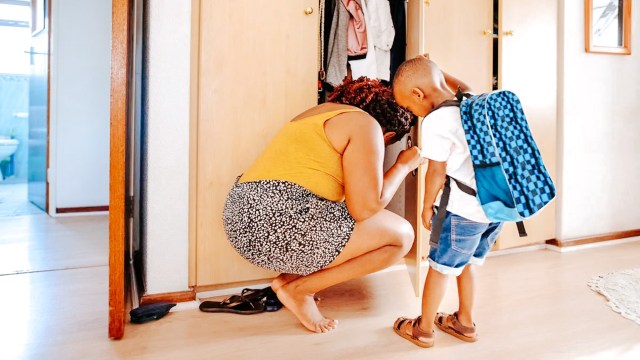This article is sponsored by Gabby’s Dollhouse: The Movie. Just like your favorite school subjects, Gabby’s big-screen debut encourages a growth mindset through flexible thinking and learning from mistakes. Only in theaters on September 26th.
Getting my kids out the door in the morning feels like choreographing a Broadway dance number—one in which the dancers are klutzy and trip over one another. Maybe we’re just not morning people, but it can feel insurmountable to coordinate four people’s early a.m. routines. No matter how organized my partner and I try to be as stage managers, I feel like a failure when I hear my older daughter say, “Where are my shoes?” just as the school bus rounds the corner. Even worse are the mornings when shoes, backpack, and lunch all go missing at once.
With my younger child starting preschool this fall, all of us will need to leave the house at the same time. So I’m determined to understand why we’re having trouble and strategize some solutions. As a librarian, I know that all learning requires self-reflection and rehearsal. That’s why we’ve been practicing our routine this summer during those mornings when we have timed zoo tickets or playdates. It’s easier to adapt our habits when the stakes are lower and we don’t risk being late to work and school.
In a professional training I attended with learning specialist Craig Selinger, the C.E.O. of Brooklyn Letters and Themba Tutoring, I learned that leaving the house actually requires well-developed executive functioning skills—something we probably don’t assume when watching our kids aimlessly ping-pong around. When you’re tired, it can be even more challenging to accomplish a step-by-step task while filtering out distractions and managing your emotions. You must also use working memory, drawing from past experiences to analyze what is needed in the present (Did your sneakers feel too tight yesterday? Today you need to wear the other shoes!)
RELATED: Here’s Why I Don’t Tell My Kid to Have a Good Day—and What I Say Instead
According to Harvard University’s Center for the Developing Child, executive function is like “…an air traffic control system at a busy airport” managing “dozens of planes on multiple runways.” (This sounds exactly like the mental overload I experience almost every morning.)
Knowing all of this, I try to think of myself as an educator in the mornings, not a cranky mom. It’s worth being intentional and patient as I help my daughter build her executive functioning skills. (I’ll try to remember that the next time I lose my cool!) Here’s what my family has tried:
Assign Morning Roles
Are the adults doing all of the heavy lifting? Can the older kids do jobs that help the whole family, not just themselves? My 10-year-old fills all the family water bottles. The 3-year-old can turn off the lights or press the elevator buttons. When a kid knows the family is depending on her, she might actually pull herself together more efficiently.
Give Kids “Cues” with Certain Signal Phrases
When I ask my toddler, “Do you have your puppy?” she knows that I’m really serious about leaving the house. The way an actor will listen for a cue, a kid who doesn’t have a great sense of time or urgency will understand that certain lines or actions signal departure. I also turn off lights when my toddler has trouble grasping that it’s really time to go.
Post “Obvious” Reminders on the Door
I’m a fan of large self-stick Post-its, which I often put on the door with our daily routines and reminders. When we go to the beach, the list reads: “Towels, sand toys, sunscreen.” When school starts, it will be “backpack, lunch, water, shoes.” Younger children aren’t always systematic thinkers, especially first thing in the morning. Their executive functioning skills need constant support. I get exhausted issuing the same reminders, so I’m going to use my lists more this fall.
Prioritize/Catastrophize
This summer, on nights before a trip, I’ve asked my older daughter to identify the item she would be most disappointed to leave behind. Can she imagine herself getting to the beach and not having sunscreen or swimwear? Water can be easily purchased, but a bathing suit can’t.
We are not, in fact, very good at packing entire bags the night before when our nighttime routine feels cumbersome already. But now we prioritize the essential items and hang them from a bag on the doorknob, or even block the doorway with the bag so it can’t be ignored.
Clocks, Timers
The other day I realized that my partner and I get grumpy about our kid’s time management skills, but we’ve never given her a clock. Everyone uses clocks on their phones now, so we’re thinking of a digital wristwatch (rather than a distracting Apple watch) for the fall. We will also set timers on our phones to indicate that we’re 20, 10, and 5 minutes away from departure.
With any luck, these rehearsals will prepare us for a smash hit in September.
Jess deCourcy Hinds (jessdecourcyhinds.com) is a writer and librarian. Sign up for her free quarterly newsletter, I’m an Open Book: On Love, Libraries and Life-building.











